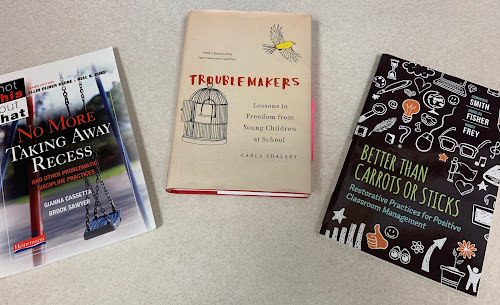As an educator, three of my all-time favorite books that are directly related to education are as follows:
I read Shalaby's debut book in June 2018. To describe this book in a word, 'Wow!' And although it won't sit well with everyone that's okay; it's good to have our thinking stretched in ways that make us uncomfortable. Check, this book does that. Shalaby shares the school experience of four elementary school children before closing with a powerful letter to teachers.
"...schools value quiet children over loud ones and operate as though adults are the only teachers in the room. The adults get to speak while they young people listen. Questions are answered rather than asked. Our schools are designed to prepare children to take their assumed place in the social order rather than to question and challenge that order. (p. xvi) ...I am calling on all educators - those in our classrooms, in our homes, and on our streets - to embrace and to respond to the urgency of our collective need to teach love and to learn from freedom. (p. xviii) ...We cage the birds singing most loudly. (p. xx) ... Responding differently to our troublemakers is paramount to meeting our responsibilities as educators and as human beings." (p. 180)
Better than Carrots or Sticks: Restorative Practices for Positive Classroom Management, by Dominique Smith, Douglas Fisher, and Nancy Frey. ASCD, 2015.
I read this book in January 2016, and it was probably my first introduction to restorative practices. It was more than just a book about restorative practices, however. This book emphasized, at the foundational level, relationships and high quality instruction. Those are your starting points...for everything else! Furthermore, I would make a strong case that relationships precede high quality instruction.
"...restorative practices approach is a philosophy rather than a method. (p. 110) ...Restorative practices must be about reintegration, not marginalization. (p.113) ...restorative approach acknowledges that young people make mistakes in the process of growing up and that these mistakes provide them with an opportunity to learn. (p.114) ...formal restorative practices define justice as getting well rather than getting even." (p.116)
No More Taking Away Recess and Other Problematic Discipline Practices (No This but That), by Gianna Cassetta and Brook Sawyer. Heinemann, 2013.
I read this book in June 2015 because, despite being a tradition that is rooted deep in many schools, I knew that taking away recess was not an effective consequence. I was hopeful that this book would provide a list of alternative consequences for students for when they misbehave. It did not. Instead, it focused on the how to of building positive relationships; due to positive relationships we are better able to prevent the behaviors that once pigeonholed us into taking away recess.
"Through our relationships, we communicate to students what we expect of them - good and bad - and this often becomes a self-fulfilling prophecy." (p. 25)
On the surface these are books about: behavior, discipline, classroom management, consequences, punishment, rules, etc. But these books are about much more than those narrow topics. These are books about anti-racism and how that can be influenced within education. They're books about our mindset and how that influences everything that we do and everyone that we come into contact with. They're books about relationships, love, and humanizing people; they're books that force us to focus on a process and not necessarily an outcome, which will require us to be patient. They're books that stress the importance of forgiveness. They are books about teaching.

No comments:
Post a Comment